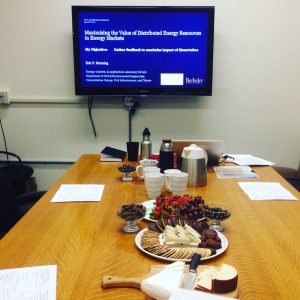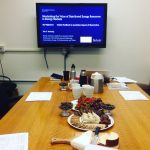Every PhD student dreads Qualifying Exams, the big checkpoint en route to the dissertation. In Berkeley’s college of engineering, they have particular weight: as there isn’t a thesis defense, the 3-hour oral Qualifying Exams is the one big check on your research progress. My quals went so much better than expected -useful feedback, no tough questions, and the committee adjourned an hour early- that I thought I’d share my preparation tips for others.
While the pass rate is high (>80%), Berkeley PhD students are perfectionists, and I reached out to prior students for advice and blocked out 3-4 weeks for prep. During an initial meeting with my advisor, I was swayed to focus the presentation on getting feedback on my proposed research- not reporting on prior progress or displaying brilliant math tricks (though there was a little bit of that).
Once the rough structure was defined with my advisor, I worked on refining my storytelling. Practicing the presentation made it clear that I needed to specifically call out the questions that inspired my research, steps I took to answer them, and the remaining steps I would complete before graduation. Through all of this, I had to resist the urge to bury the story with math and details.
When sharing the presentation outside of my research group, I quickly realized that I had to be concise and clear. My deck had 26 content slides for a presentation designed to last 45 minutes; this was the perfect length. I pared down the math to equations essential for conveying the core of the research, and simplified the way I presented it (e.g. grouping constraints and simplifying indexing). Having heard horror stories of students whose committees spent an hour drilling into every detail of the first dense math slide, I was prepared to defend or derive each equation I showed, but more importantly I knew how they tied in with the story so that I could avoid going down that rabbit hole.
As soon as I had a draft of the deck complete, I started practicing and getting feedback. For me, practicing alone in my room by talking to the computer is useless- I need to see somebody’s face to pace my presentation and calm my self-doubt. As I practiced, I got a sense of where people were confused and where my story was weak. The most useful practice session came with a set of PhD students advised by the members of my committee, but with whom I hadn’t previously worked- this was invaluable for getting me outside of my normal research bubble.

Attention to detail and lots of rehearsal leads to this point.
During the presentation, it was important to keep moving and not lose sight of the overall story. In the initial overview of the talk I highlighted the background sections and the novel content, so that they could save questions for fruitful discussion of my research contributions. When conversation turned to areas where I was weak, I told them my plan for improving my skills, took notes on their suggestions, and led us back to the main thread of research. This helped keep us on track, and even finish early- the committee adjourned for deliberation after just two hours, a huge relief for me!
Afterwards, I was told that the committee had been very impressed by my preparation- dressing in a suit, artfully presenting a set of well-chosen snacks, and presenting a deck that was well-designed and clearly laid out. These little details helped show that I valued their time, and took the exam seriously- and throughout the discussion I took notes on their feedback and thanked them for their advice.
In summary, a few thoughts from my experience and the wisdom I collected from other students who went before:
- Spend 2/3 talking about prior work, and 1/3 (or more) highlighting open questions, next steps, and novel contributions you’ll be making.
- This is the chance to weave a story- save proof derivations for your papers.
- Stay clear and concise; only add details and equations when necessary
- Keep moving: you want to cover your whole body of research, and avoid going down rabbit holes that can lead to off-topic questions
- Practice makes perfect, ideally with people outside your research group but who are advised by your committee members
- Don’t stress out. Preparation should be exciting, rewarding, and enjoyable. If you’re solid on your research, it’s unlikely that you’ll get off-topic questions about course trivia (unless that’s explicitly the goal of your committee, which you should know beforehand)
Things went smoothly for me, and I hope these notes can be helpful for others preparing for Quals. I must have been well prepared, because the snake fight portion was very easy indeed 🙂
I’m happy to share a copy of my deck- reach out or comment!
